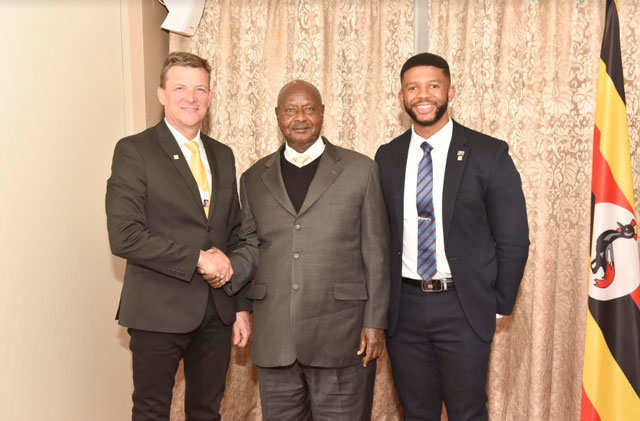
President meets Group CEO
Meeting the company’s Group Chief Executive Officer Rob Shuter on the sidelines of the recently concluded World Economic Forum in Davos, Switzerland on Jan. 23, President Yoweri Museveni said it is time for the telecom firm to list on the stock market.
“We had issues of people cheating our taxes and under declaring calls. We bought our own machines and were able to see all this. It is important that you float shares on the local stock exchange to allow for local ownership,” he said.
Museveni is reported to have been displeased with the fact that telecom firms are ‘milking’ vulnerable Ugandans by not adding value to their products but instead extending ‘talking’ services as the country loses foreign exchange.
Company’s revenue up
According to the group’s half year results of 2018, MTN Uganda’s revenue expanded by 8.8% to Shs734.4bn on account of improved data revenue and mobile money revenue exceeding expectations.
MTN Uganda CEO, Wim Vanhelleputte, said in a notice that the company is well positioned to deliver growth in the sector despite the shake ups experienced in the market recently that were occasioned by the newly introduced excise duty tax regimes on OTT and mobile money.
“Our half year results notwithstanding, I see MTN ending the year on a good note,” Vanhelleputte said.
Earlier in 2017, the revenue growth for Uganda was recorded at 10.7% to Shs 1.68 trillion in 2017 compared with Shs1.5trilion in 2016 supported by growth in demand for data and digital services.
Its main rival, Airtel – trading as Bharti Airtel Limited, operating in 20 countries across South Asia and Africa, recorded a 53% growth in net profit in Uganda to Shs245bn in 2017.
MTN’s Shuter, however, said Uganda has only 5% shareholding in MTN and that they are in the process of negotiating how to sell some shares to National Social Security Fund.
He acknowledged that disguised calls that led to less tax are a shared problem and that his company was committed to resolving this and complying with the laws of Uganda.
He said MTN is open to any investigations to resolve the issues raised following its licence renewal process.
Issues under contention in the National Broadband Policy that are part of licensing framework:
- National coverage – An operator who seeks a national operator license must be able to cover the entire geographical area of Uganda so as to enable universal access, promote effective competition and quality of service.
- Spectrum management- The spectrum being a scarce and finite national resource, it needs to be managed and utilised efficiently, optimally and rationally. These resources should not be owned by the private telecom service providers. This will also aim to outlaw hoarding of spectrum and enable realisation of true economic value of the spectrum through spectrum re-farming. The principle for all operators will be ‘use it or lose it’ and no operator when selling its 13 stake through ‘Mergers & Acquisitions’ should have a claim on spectrum. The policy also aims for unbundling of spectrum allocation and license
- National roaming – Roaming refers to the ability of a customer to automatically make and receive voice calls, send and receive data, or access other services, even when travelling outside the geographical coverage area of his service provider, by means of using the service of the other service provider’s network. Currently within the country, customers of one service provider cannot access the ICT services of the other service providers. The policy aims to enable customers to have seamless access and coverage irrespective of their network. This will ensure universal access to ICT services
- Number portability –refers to the possibility for subscribers to retain their telephone number when changing network operator or when changing geographic location. Currently the customers cannot switch from one service provider to another service provider, without changing the telephone numbers. The policy aims to empower the customers to choose their service provider without the challenge of changing telephone numbers
- Structured renewal of license – Currently there is no clear policy for renewal of all licensees’ and some licenses stipulate automatic renewal on expiry of the current license. This policy aims to provide for a structured renewal framework for the licensees taking into the consideration of roll out obligations, quality of service and technological developments
- Listing of all telecom operators on the local stock market as a licensing condition will help on mitigation of capital flight among other benefits of local content development opportunities that come along.
 The Independent Uganda: You get the Truth we Pay the Price
The Independent Uganda: You get the Truth we Pay the Price


